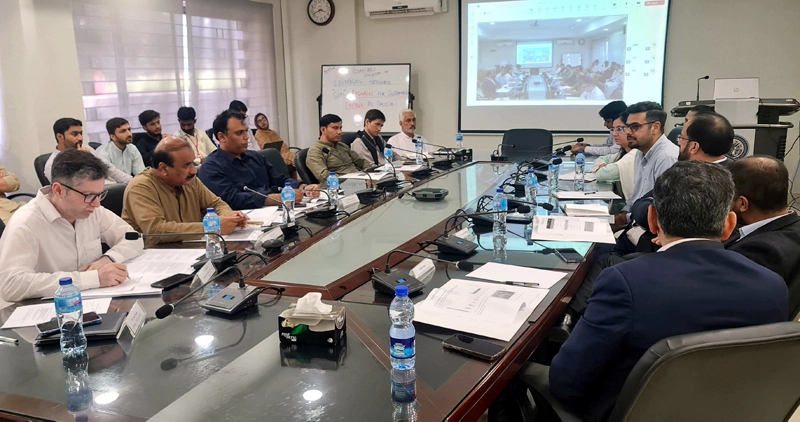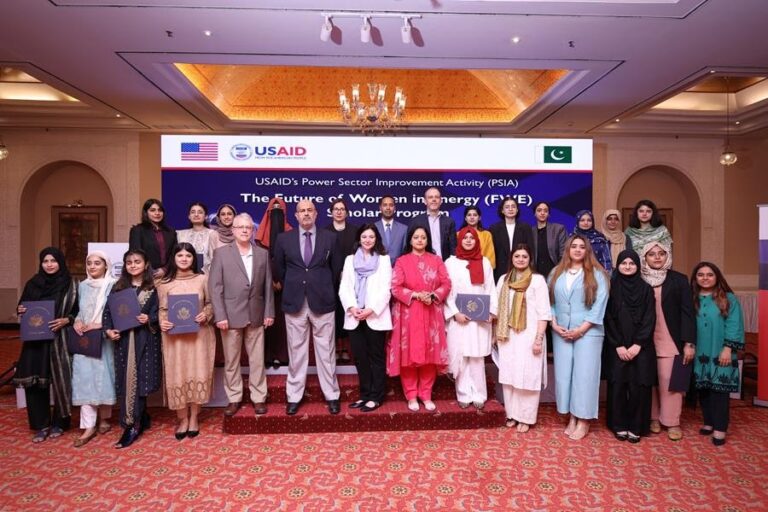Thar Coal Critical for Attaining Energy Security, Maintaining Baseload: Energy Experts
Staff Report: Pakistan’s renewable energy plans need to be coupled with utilization of thar coal to achieve energy security and maintaining baseload requirement instead of relying on imported fuel. This was the consensus reached at a seminar title “Leveraging Indigenous Coal Resources for Sustainable Energy in Pakistan” organized by U.S. Pakistan Center for Advanced Studies in Energy (USPCAS-E), NUST.
Highlighting the current challenges faced by the power sector and strategies needed to achieve stable and sustainable energy ecosystem, speakers present at the session stressed on converting imported coal-based power plants on local coal to provide relief in tariff to power consumers and remove undue pressure on national exchequer because of coal imports.NEECA and AU will collaborate to promote energy efficiency and conservation in the Energy Sector.
After the opening remarks by Dr. Adeel Waqas – Principal, USPCAS-E, the session started with Dr. Majid Ali, Associate Professor at USPCAS-E presenting a whitepaper focusing on opportunities available for the power sector by utilizing Thar coal. Citing the report, he said that the trend to utilize coal for power production was persisting and provided example of Pakistan’s neighboring countries such as India and China which were producing at 1363 and 5420.04 TWh of electricity through coal as baseload.
He then highlighted that despite having abundance of indigenous coal resources available in Pakistan, the country continued to import expensive fuel for power production that was slowing down the growth of Pakistan’s economy as the same amount could be used for other development programs.
He further shared the recommendations of the report that upcoming power plants such as Jamshoro Power Company Limited-1 (JPCL-1) should immediately be converted to local coal as it would set a precedent for other power plants to follow. He further emphasized that a robust railway link/ transportation system should be introduced to ensure continuous supply of coal from Thar at minimum cost.
Ali Nawaz, DG Thermal at Private Power & Infrastructure Board (PPIB), while clearing myths regarding thar coal, said that it was not factually true that Thar coal was of sub-quality, or it possessed high percent of sulfur. He highlighted that the sulfur in Thar coal ranged from 0.8% to 0.821% while the sulfur in sub-bituminous imported coal that was being used for power production in the country ranged from 1% to 1.2% so that was not a big challenge.
He said that the quality of Thar coal was further tested in Lucky Power Electric Company and in Shanghai Electric’s power plant and it had been more than a year since it was working successfully. Ali Nawaz further revealed that PPIB had engaged a German consultant regarding the feasibility of imported coal-based powerplants especially Sahiwal Port Qasim and Hub Coal could successfully operate on Thar coal. Regarding the railway link between Thar and Chor, he mentioned that the Prime Minister of Pakistan is going to inaugurate it on upcoming Monday. He lamented that in past 4-5 years, Pakistan had spent more than 4-5 billion dollars on importing coal for power production.
Farrukh Ahmed – Head of Environment at Bestway revealed that after little modification they had successfully run their plants on local and Thar coal. He said that if other industries could utilize Thar coal, billions of dollars could be saved from the national exchequer. Regarding renewable energy, he highlighted that while it was ‘good to have’ as an option but availability of energy was a ‘must-have’ therefore it was important that local coal should be utilized and don’t just follow what other parts of the world was doing, instead we should keep in view our own unique energy landscape.
Shahab Qader, Chief Strategy Officer at K-Electric said that most of the countries that produce coal utilize the maximum chunk of it for their own needs while very little amount of it was exported because coal supports the producer country’s economy – this is what we as a country should do. He said that there was no doubt that the future of energy was renewable however, we would have to go through a transition phase and local coal provides you that transition space. He further added that the country was not talking about adding new capacity using indigenous coal but transforming the existing one from imported to indigenous one. He said at K-Electric, we were following a balanced approach towards renewable resources and utilization of indigenous resources.
He added that at renewable energy front, K-Electric was doing projects of around 1,200 MW as part of its future and has recently attracted lowest bid for its solar related bids.
Afia Malik – Senior Research Economist at Pakistan Institute of Development Economics (PIDE) said that while utilization of local and Thar coal was a must, Pakistan should also be focusing on upgrading the plant technologies to mitigate environmental impacts and improve efficiency.
Ali Khizar – Head of Research at Business Recorder lamented that Pakistan was very late in turning its focus towards Thar coal, it should have turned towards it at least 50 years ago and now there was a lot of global pressure to face because the world was moving away from coal. He also agreed that utilization of local coal was necessary but important to pay heed to challenges and risks involved.
Abubakar Ismail – Head of Energy & Sustainability at Amreli Steels emphasized that the challenge of integrating renewable energy, particularly solar power, with traditional thermal plants in Pakistan. He pointed out that thermal plants, typically used for baseload power, are not well-suited to complement solar energy, which requires quick-ramping plants to maintain grid stability.
Given Pakistan’s relatively low energy demand, he stressed the importance of maintaining peak demand plants for the evening hours, alongside solar energy, to achieve a reliable and stable energy mix that effectively balances the different sources.
The seminar concluded with a strong call to action, urging a collaborative approach to tackle the challenges related to coal utilization in Pakistan. It emphasized the importance of aligning efforts across government, industry, and academia to ensure that the country can sustainably and economically harness its indigenous coal resources.








